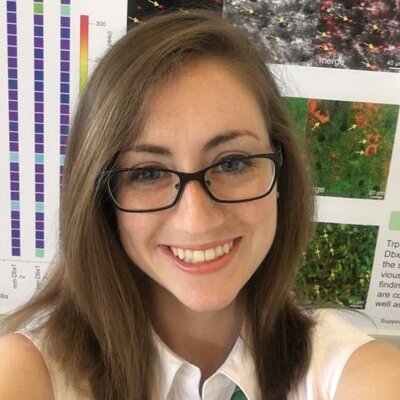Team
Kaitlyn Dorst

How I got into science
I was "that kid" that was super into watching "Bill Nye the Science Guy" when there was a substitute teacher--not just because it involved not doing schoolwork, but because I really liked learning about SCIENCE! My particular interest in biology was cultivated when I took Mrs. Thorvaldsen's biology class in 8th grade. I was ridiculously into the labs and I was also "that kid" that was eager to use the microscope to look at tissue samples while the other kids were squeamish in a corner. Mrs. Thorvaldsen was thoroughly impressed with all of my coursework and she encouraged me to keep pursuing my love of science. I always had that innate curiosity about how life around us works. I loved asking questions (and I still do!).
When I was a rising senior in high school, I took on an internship under the guidance of Dr. Christopher Del Negro in the Systems Neuroscience Lab at William & Mary. The lab examines the neural underpinnings of breathing behavior. This was my first experience in a collegiate lab that was dedicated to research. I was paired to work in tandem with a graduate student, but my tasks were simple while I also had the opportunity to observe their work. Although the internship lasted for a summer, it put my ideas for my career in perspective. Beforehand, I was considering pursuing medicine, but I started to like the idea of research more. So when I decided to matriculate to William & Mary as an undergraduate, I did not hesitate to contact Dr. Del Negro about continuing my work in the lab. He was more than excited to take me back on as a student. Over the subsequent four years, I developed many crucial skills to be a more mature neuroscientist while maintaining lasting friendships with my colleagues. I'll always thank Dr. Del Negro for his persistence and guidance. If it wasn't for him, I wouldn't be where I am today.
Now at BU, I'm more than thrilled to take on my dissertation research. I've always had an interest in studying cellular and molecular mechanisms of memory. Different neuropsychiatric and neurodegenerative diseases all have intersections in memory dysfunction. Our memories tell our stories. They comprise our essence, shape our personality and experiences, make us feel emotions, and allow us to recognize our loved ones. I understand that we may be a ways away from a total cure to something like AD, but it is equally important to understand the basic science surrounding memory dysfunction. This is one of my biggest goals while I'm here at BU.
Non-science biography:
I was born and raised out on Long Island (but I keep it hush hush when talking about sports) and moved to Williamsburg, VA when I was 13. I absolutely hated the idea of uprooting my life and experiencing so much change. Jokes on me, I’ve met some of my closest friends and was so excited to move back up north. I now embrace change, as scary as some of it may be.
Outside of the lab, you can probably find me either at the gym (shoutout to Spike Train, the IM volleyball team!), a cafe, or biking around Boston. I think Boston is such a fun place to be as a young scientist--there’s always something to do! I enjoy attending concerts at any of the local venues and looking through art exhibits at the museums.
Research Interests
While at William & Mary, I performed a series of whole-cell patch clamp experiments to understand some of the molecular mechanisms surrounding breathing behavior. Now, at Boston University, I’m taking an in vivo approach to examine how one ensemble of cells within the dentate gyrus encoding a fear memory can alter downstream neural activity to flexibly generate different behavioral phenotypes.
Favorite...
Book:
Honestly can’t pick just one, I’m a self-proclaimed bibliophile
Movie:
Anything 90's Disney
Show:
Avatar, The Legend of Korra; Game of Thrones (Seasons 1-6)
Food:
Sushi, Buffalo wings, Mozz sticks
Drink:
Matcha Lattes, Lemonade, Guinness
Activity:
Spontaneous Target Adventures
Coffee, friend or foe:
BFFLs
One thing I’m sorry I’m not sorry about
I freaking LOVE corgis.
What I look for in a scientist
I really appreciate the candid nature of scientists that speak their truth whether it’s about science, work, or life. Impostor syndrome is very pervasive in academia, and people don’t often talk about the bad that comes with the good. Science is mostly messy, which is why transparency is also important. I firmly believe that if we put our egos aside, science can be a lot more efficient.